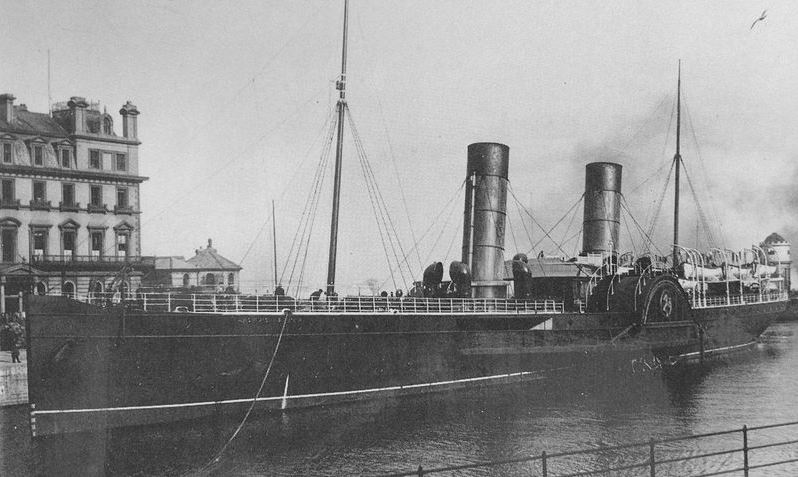HMPS Mona's Queen
From Our Contribution
 | |
|
File:Mona's Queen on war service.jpg Mona's Quen in dazzle paint scheme. | |
| History | |
|---|---|
| Name | HMPS Mona's Queen |
| Owner | Isle of Man Steam Packet Company |
| Builder | Barrow Shipbuilding Co, Barrow-in-Furness |
| Launched | 18 Apr 1885 |
| In service | 1885 |
| Out of service | 1929 |
| Fate | broken up 1929 |
| General characteristics | |
| Type | paddle steamer |
| Tonnage | 1,599 tons |
| Length | 320 ft 1 in (97.6m) |
| Beam | 38 ft 3 in (11.7m) |
| Depth | 14 ft 5 in (4.39m) |
| Propulsion | 2 side mounted paddle wheels |
| Speed | 19 knots (35.2 km/h) |
Remarks
Built for the Isle of Man Steam Packet Company.
She was chartered by the Admiralty in 1915 and used as a troop carrier. Her fit her out was undertaken by the Steam Packet's own workshops in Douglas. Her initial task was to ferry troops mainly between Southampton and the main port serving the British Expeditionary Force at Le Havre.
On 16 Feb 1917, she left Southampton with over 1,000 troops embarked. Less than an hour's steaming from Le Havre the German U-boat SM UC-26 surfaced almost dead ahead, and not more than 200 yards away. The Mona's Captain maintained his course, and when within about ten metres of the submarine a torpedo was observed travelling underneath the ship, and then to track away to starboard. The U-boat was almost instantaneously hit by the port paddlebox of the Mona's Queen, her steel paddle floats rammed into the submarine's bow and it was severely damaged.
Damaged, Mona's Queen managed to steam slowly to Le Havre where the troops were disembarked. She then set off for repair work in Southampton, eventually reached Southampton, taking more than twice her normal time. After her repairs she returned to her trooping duties in March 1917.
Mona's Queen rejoined the Steam Packet fleet in time for the 1920 tourist season, and continued with her normal duties. She was the last paddle steamer in service with the Company which decided to dispose of her in 1929. Sold for breaking to Smith & Co. Port Glasgow.